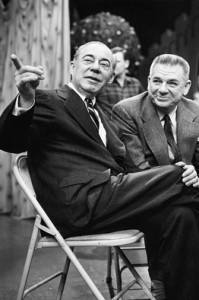 It may be hard to believe but The Sound of Music was not originally seen as a musical. The tale of Maria Augusta von Trapp, which was based on her book The Story of the Trapp Family Singers, was to be a play. Here’s how this iconic musical came to be.
It may be hard to believe but The Sound of Music was not originally seen as a musical. The tale of Maria Augusta von Trapp, which was based on her book The Story of the Trapp Family Singers, was to be a play. Here’s how this iconic musical came to be.
The Original Idea
Stage director Vincent J. Donehue came up with the idea that the story of Maria von Trapp would be the perfect vehicle for actress Mary Martin. Martin and Donehue, who were friends, enlisted Broadway producers Leland Hayward and Richard Halliday (Martin’s husband) and the project started to take shape.
Donehue got the idea for the play after viewing a 1956 West German film about the von Trapp family, and seeing its 1958 sequel which was entitled Die Trapp-Familie in Amerika. Howard Lindsay and Russel Crouse were brought on board to write the play and the producers envisioned that it would include songs from the repertoire of The von Trapp Family Singers.
Change in Plans
It was not long before everyone agreed that the story would be well served by including original songs and making the play into a musical. Although The Sound of Music is certainly not Rodgers and Hammerstein’s most innovative work, critics say it gets get overly sentimental, it is not as flawed as some might claim.
It is not Oklahoma!, Carousel, or South Pacific, but it is an engaging tale that offers audiences some of their most memorable songs, such as “The Sound of Music,” “Edelweiss,” and “My Favorite Things.” Also included are “Maria,” “Climb Ev’ry Mountain,” “Do-Re-Mi,” and “The Lonely Goatherd.” Other tunes popularized by the musical are “Sixteen Going on Seventeen,” “My Favorite Things,” and the rather cynical “How Can Love Survive?” If amazingly popular songs make great musicals, then The Sound of Music is certainly a great work.
The Book
The Sound of Music marks the last work undertaken by Rodgers and Hammerstein and it is the first time that Hammerstein did not write or co-write the book. Lindsay and Crouse had a longtime partnership that started in 1935 and lasted until 1962. Together they wrote the long-running play Life with Father and in 1945 they won the Pulitzer Prize for State of the Union. Life with Father, which still holds the record for the longest running play in Broadway history, opened in 1939 and was on The Great White Way for over seven years, offering 3,224 performances.
But the writing team of Lindsay and Crouse was unlike Rodgers and Hammerstein and Kern and Hammerstein. The fact is Oscar Hammerstein had a penchant for wanting to be innovative, different, and groundbreaking. Lindsay and Crouse were very good at writing plays that fit within genre specifications. There’s nothing wrong with this, but taking Hammerstein out of the mix when it came to writing the book pretty much guaranteed that the libretto for The Sound of Music would be solid and functional and not much more.
The Hills Are Alive
The Sound of Music ran for over three years on Broadway, offering 1,443 performances. The conservative nature of the book, which in no way reflects the innovative aspects of Hammerstein’s works such as Show Boat, Carousel, or South Pacific, was perfect for a post-1950s generation that was attempting to hang onto traditional beliefs while the likes of Bob Dylan, Simon and Garfunkel, The Beatles, and the Rolling Stones were taking over popular music.
As The Sound of Music occupied the stage of the Lunt-Fontanne Theatre and later the Mark Hellinger, where it transferred in 1963, American radios were no longer playing hits from the Broadway stage as they had in the past. Yes, the times they were a’ changing. Rock and roll and folk music marked the sign of the times and Broadway tunes were being relegated to LPs and conservative FM radio.
Popularity of The Sound of Music
The film of The Sound of Music was hugely popular. In 1965, it premiered with Julie Andrews as Maria and Christopher Plummer as Captain von Trapp. It was nominated for 10 Academy Awards and won five. It cost $8.2 million to make and grossed a whopping $286,214,286. To say it was hugely popular would be an understatement. The American Film Institute has given it many awards, including placing The Sound of Music 55th in their 100 Years… 100 Movies list.
The Sound of Music is an interesting Broadway conundrum. A very good stage musical that managed to be a bigger hit as a film, and a musical that has some of Rodgers and Hammerstein’s most beloved melodies but a book that is more or less functional. It marks the end of an era when musicals by Rodgers and Hammerstein set the standard for Broadway. Hammerstein died in 1960, less than a year after The Sound of Music opened on Broadway.

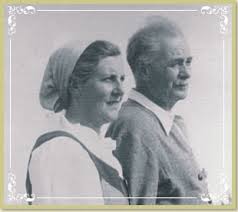
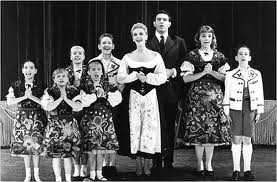
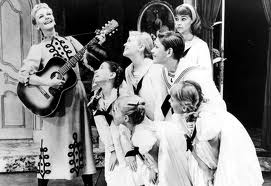
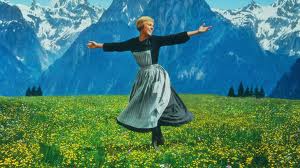
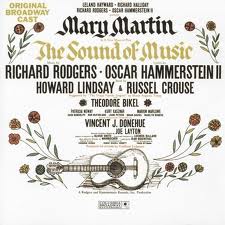
Pingback: Lindsay and Crouse: Life with Father, Anything Goes, Arsenic | Broadway Scene